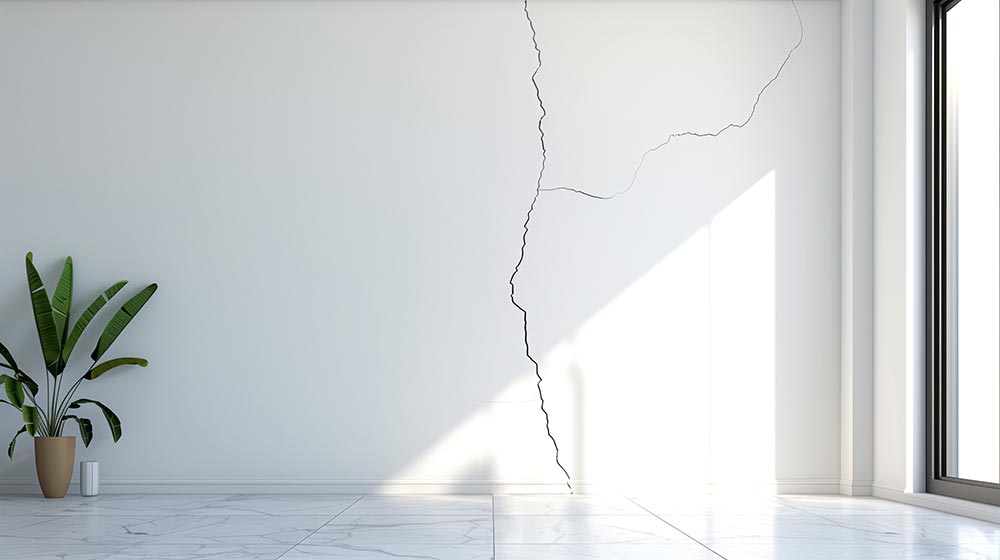The foundation is one of your home’s most important structural elements. It can provide stability and support for the entire structure, but foundations can deteriorate over time. It can also develop problems that could result in serious and expensive problems over time. The good news is that not all repairs are as complicated or as expensive as you may think, but you need to know the difference between minor issues and major problems.

Here are some early warning signs that your home needs foundation repair.
#1: Cracks in Your Walls and Ceilings
This is one of the most obvious signs that your foundation needs to be repaired. Some hairline cracks are often caused by normal settling and aren’t usually much of an issue, but larger or widening cracks can be signs that you have a serious structural problem. Pay close attention to cracks that run diagonally and are wider than normal, because they can be signs of foundation movement or settling.
#2: Uneven or Sloping Floors
If you notice that your floors aren’t level or have developed a noticeable slope (specifically toward one direction), it could be a sign of a foundation problem. Uneven floors can be caused by a number of factors. Some of them can include the following:
- Soil settlement.
- Foundation settlement.
- Shifting or sinking of the foundation.
As the foundation moves or settles, it can cause the floor to become uneven. It can also make it harder to move furniture or appliances. Not to mention, the potential tripping hazards.
#3: Doors and Windows That Stick or Won’t Close Properly
If your foundation shifts or settles, it can cause the framework on your doors and windows to become misaligned (which can cause them to stick or not close properly). It can also create gaps between the door or window frame and the wall, which will allow drafts or moisture to come into your home.
#4: Visible Cracks in Your Foundation
If you can see cracks that are at least 1/4 inch wide (either from the exterior or interior), it’s a clear indication of a foundation problem. These wide foundation cracks can be caused by a number of issues. Some of them include the following:
- Soil movement.
- Hydrostatic pressure.
- Poor construction techniques.
If you ignore these cracks, your foundation can become seriously damaged.
#5: Separation of Walls and Floors
If your floors or ceiling separate from the walls, it’s a sign that your foundation needs to be repaired. This kind of separation can happen as the foundation shifts or settles and can cause the walls to pull away from the floors or ceilings. You may start to see gaps or cracks where the walls meet your floors or ceilings. You may even see daylight coming in through these gaps.
#6: Exterior Brick or Veneer Cracks
If you have an exterior that’s made of brick or stone veneer, keep an eye out for cracks or separation in the masonry. They can be the result of foundation movement or settlement, which can put stress on your exterior walls and cause the masonry to crack or separate.
#7: Sagging or Leaning Floors, Walls, or Ceilings
If you see any sign that your floors, walls, or ceilings are sagging or leaning, it could be the result of a serious foundation problem. This can happen when the foundation can no longer provide enough support for the structure (which can cause the floors, walls, or ceilings to sag or lean).
#8: Exterior Soil Erosion or Settlement
Take a look at the soil around your home. And if you see any signs of erosion (such as deep gullies or depressions) or that the soil is settling unevenly, it could be putting stress on your foundation (which can lead to potential issues).
#9: Buckling or Warping Floors
If you have hardwood or laminate floors, pay attention to any signs of warping or separation between the boards. It could be the result of a foundation that’s shifting or settling, which can cause the floors to become uneven or distorted.
#10: Poor Drainage
Water is the leading cause of foundation problems, and it’s often caused by improper drainage. Water needs to move away from your home. But if it doesn’t, it will accumulate around the foundation. This can cause the soil to expand, which can add pressure that may lead to foundation damage. If you see any soft, wet soil around your house after it’s rained (or if the soil is unusually dry after the same event), you may have a drainage problem that needs to be taken care of.
If you’re looking for one of the best places for foundation repair in Corpus Christi, be sure to get in touch with Streem Foundation Repair.
